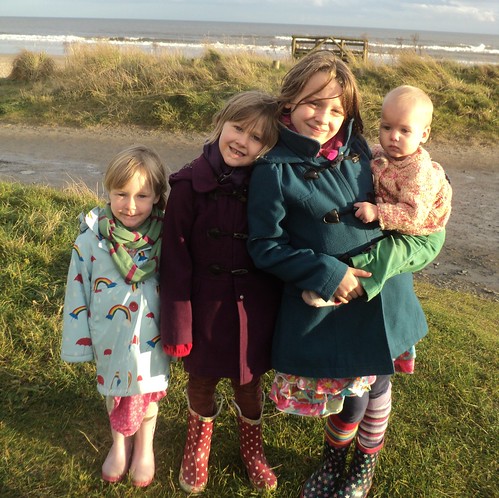We have guests, and I'm struggling. The mum involved keeps smacking her little girl and it's upsetting Jenna a lot, I really don't know what to do about it. Earlier the girls all found some glitter in a drawer and tipped it out; I told Jenna I didn't care whose fault it was we were all going to clear up anyway - she helped me and said that she was sorry for making a mess and could we get the glitter out another time to make things downstairs? When the other little girl admitted that she had played in the glitter and also she was sorry, she got a smack. I can't help but think that surely that's an incentive to lie!
We usually take the tack that it doesn't matter who actually made the mess. It stops everyone handing out blame and denying their involvement, and takes away the fear of being singled out for a talking to. Even if I see something get spilled I'll just ask whoever is nearest to help me fetch a towel and clear up, no fault no blame. Jenna fetches a nappy when she thinks Morgan is going to wee on the floor. Morgan rubs up a juice spill with me when Jenna threw a cup on the floor because she was cross. We fix the immediate physical problem first and deal with the emotional reason when it's already sorted out and I don't have the puddle of milk or glue reminding me that something is ruined or lost and making me feel like someone ought to be really sorry.
What I want Jenna to learn about things that she does and shouldn't have isn't that it is BAD. Sometimes it's obvious that something was deliberate but rarely, and also her intent may have been to find something out, see how I would react, test my love for her, or underline how hurt she was. Making her feel bad about it won't magically turn her into a good person, given that I feel bad about yelling and threatening and it doesn't stop me from doing it unless I have a replacement activity for those situations! In fact the more guilty I feel the more likely I am to plough ahead anyway.
I want her to learn that whether she did something on purpose or not it can be fixed. I want her to learn that saying sorry is secondary to acting sorry, and that making up for what happened isn't a moral weight it's just what we do. If someone is sad we comfort them, before we tend to our own reasons for taking the toy or snatching the snack. If someone has lost something we help them find it before we reason about whether putting things away properly was their job or ours. Help first, disect feelings later.
I want her to learn, in a bigger sense, that she can put the past behind her - that nothing is big enough to make me see her as a bad *person*. And I want her to, in the most trivial way, think about her actions before she does them not because she's scared I might scream at her but because she knows that she will have to deal with the literal physical aftermath.
Anyhow, I can't put that into a simple sentence that isn't confrontational or moralistic or both. So I'm going to try to just reassure Jenna that I'm still going to be gentle with her - and try also to strengthen her lovely impulse to comfort her crying friend and remind her that hands are also for healing and caring.
Subscribe to:
Post Comments (Atom)











No comments:
Post a Comment
Penny for your thoughts? :)